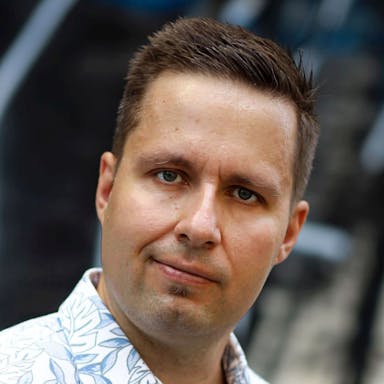
Martin Koníček
Blog
How and why I educate myself.

My Beginnings
When I got into IT almost twenty years ago, it was a turbulent time, still full of small firms. One of my first jobs was in a company that dealt with VoIP and believed it was the future of communication - unlimited tariffs on mobiles were far from existence then, in fact, my first company phone had buttons.
When I arrived at my first job in London, I got a bit lost. There were no timetables in the mobile or GPS, you could forget about that. Education looked a lot different then, people still read books about IT, and the first CBT (Computer Based Training) video courses were spread across pirate networks like downloaded CDs.
As you probably understand, today I wouldn't be able to make a living from doing the same thing as I did twenty years ago. Of course, to some extent it would be possible, I would support Linux, write scripts in PHP, and surely such people in this dynamic age have their place, however their income is far from what it could be.
First Stagnation
I have to admit that after the stormy accumulation of IT information around my twenties, I simply started to stagnate as I approached thirty. I constantly felt like a Linux admin, and I wasn't moving forward - I suppose it happens to most people this way.
It's not that I never learnt anything new, every now and then someone would come to work and introduce us to a new technology, which I learnt by trial and error, but it was never the same. It's that thing we often hear around us - "I learn all the time at work, every day there is some novelty."
However, these daily bits that almost everyone picks up at work is not really complete education, if we want to understand something more deeply, it has to be approached differently.
The First Swallow
For me, my "first swallow" happened about five years ago when I started studying an AWS course for work. It was extensive, and the company gave me one year to complete it, including the certification. I studied it for about 30 minutes daily, and after a year I completed the certification.
What was interesting about it was that I was studying every day, regularly, and on my own. Once I finished the course, I immediately started studying Python, which took me two years of self-study. Suddenly, I realized that I could take "bigger bites" and study something completely from scratch through daily study with absolute ease, and daily studying has actually become a routine for me.
Since 2018, I have thoroughly refreshed my knowledge of AWS, Python, Javascript, and Kubernetes in particular. Suddenly, I became a technician who doesn't work with outdated technologies from dinosaur times, but uses the latest ones, and moreover, I learned it in a coherent way - and trust me, for example, Python variable scoping is not something people usually learn by trial and error.
How do I do this today?
Nowadays, I have a list of courses I study in a table, and every day I do one lesson for each course, altogether it amounts to about an hour of study and five lessons daily. It's definitely not the fastest way to get something pumped into yourself, but for me, consistency is a much higher priority than speed.
For example, web development, which I am interested in, I am currently getting into for about the third year, and it is starting to go quite well. Kubernetes has been my focus for the second year. And it's not just theory, I programmed my own website completely from scratch, and I run my own Kubernetes cluster at home.
The most challenging thing about it all
The hardest thing about it all is the long-term aspect, studying something often takes one year or two, and it requires work every day. At first, I was not at all capable of thinking, for example, in terms of one year. If you're used to going somewhere for a week-long training, this is a completely new level. From a week-long training, a person usually doesn't take anything, they forget as quickly as they learned it.
However, when I learn something for a year, two, those things get stored in long-term memory, and God forbid if I implement it practically, then it's a lifelong knowledge.
For me, a big surprise was also that I actually don't need anyone for it, you can just pay for a video course on Udemy for 10 euros or use the Acloudguru academy, and you progress, slowly, but surely.
Since I started studying daily, I have learned more in five years than in the previous fifteen. Moreover, thanks to this regularity, I started to enjoy it.